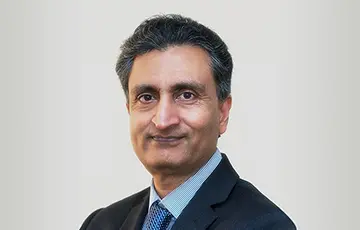Appointment(s)
Director, Cancer Science Institute of Singapore
Distinguished Professor of Medicine, Yong Loo Lin School of Medicine, National University of Singapore
Director, National University of Singapore Centre for Cancer Research
Degree(s)
Doctor of Philosophy
B of Med, B of Surg
Biography
Ashok Venkitaraman is the Director of the Cancer Science Institute of Singapore, a Distinguished Professor of Medicine at the National University of Singapore, Research Director at the Institute of Molecular & Cell Biology, A*STAR, Singapore, and the Executive Director of the NRF’s National Initiative for RNA Biology & Its Applications. From 1998 to 2020, he was the inaugural Ursula Zoellner Professor of Cancer Research at the University of Cambridge and a Professorial Fellow at Pembroke College, Cambridge. He also directed the MRC Cancer Unit in Cambridge from 2006 to 2019, pioneering advances in early cancer intervention.
Research Areas/Research Interest
- BRCA2
- Cancer
- Translational
- Innovation
- Therapeutic
Lab Description
Professor Ashok’s laboratory is dedicated to unraveling the mechanisms that make certain individuals more susceptible to cancer, with the aim of developing innovative strategies to intercept cancer at its early stages. The team uses inherited mutations in the breast cancer gene BRCA2 as a model, as BRCA2 mutation carriers are highly prone to cancer. They were among the first to demonstrate that BRCA2 protects genome integrity to suppress cancer, laying the foundation for targeted therapies specifically designed for BRCA-deficient cancers.
At the Cancer Science Institute (CSI), the lab investigates the structural and biophysical mechanisms underlying BRCA2’s function, offering insights into how cancer-causing mutations disrupt these protective mechanisms. To develop advanced therapeutic strategies, the lab has created cutting-edge technology platforms that: (1) identify and validate therapeutic targets within complex pathways, (2) modify enzyme activity through regulatory protein interactions (known as allo-targeting), and (3) explore cellular signaling pathways using novel light microscopy tools. These technological advancements have led to the formation of multiple spin-out companies from Cambridge University and fostered strong partnerships with industry and venture capital. At CSI, the team leverages these tools to seek methods to delay or prevent cancer development in high-risk individuals, collaborating closely with Professor Ashok’s lab at the Institute of Molecular & Cell Biology at A*STAR.
Professor Ashok’s research spans from basic science to clinical applications, integrating diverse methodologies including molecular cell biology, single-cell and single-molecule imaging, structural biology, biophysics, and chemistry. His leadership and commitment to cancer research continue to drive advancements, pushing the boundaries of cancer science toward meaningful clinical impact.
BRCA2 Regulates Transcription Elongation by RNA Polymerase II to Prevent R-Loop Accumulation
Shivji, M.K., Renaudin, X., Williams, C., Venkitaraman, A.R.
A Class of Environmental and Endogenous Toxins Induces BRCA2 Haploinsufficiency and Genome Instability
Tan, S. L. W., Chadha, S., Liu, Y., Gabasova, E., Perera, D., Ahmed, K., Constantinou, S., Renaudin, X., Lee, M., Aebersold, R. & Venkitaraman, A. R.
A cancer-associated BRCA2 mutation reveals masked nuclear export signals controlling localization
Jeyasekharan, A.D., Liu, Y., Hattori, H., Pisupati, V., Jonsdottir, A.B., Rajendra, E., Lee, M., Sundaramoorthy, E., Schlachter, S., Kaminski, C.F., Ofir-Rosenfeld, Y., Sato, K., Savill, J., Ayoub, N. & Venkitaraman, A.R.
Germline Brca2 Heterozygosity Promotes KrasG12D -Driven carcinogenesis in a murine model of familial pancreatic cancer
Skoulidis, F., Cassidy, L.D., Pisupati, V., Jonasson, J.G., Bjarnason, H., Eyfjord, J.E., Karreth, F.A., Lim, M., Barber, L.M., Clatworthy, S.A., Davies, S.E., Olive, K.P., Tuveson, D.A. & Venkitaraman, A.R.
HP1-β mobilization promotes chromatin changes that initiate the DNA damage response
Ayoub, N., Jeyasekharan, A.D., Bernal, J.A. & Venkitaraman, A.R.
Abnormal cytokinesis in cells deficient in the breast cancer susceptibility protein BRCA2
Daniels, M.J., Wang, Y., Lee, M. & Venkitaraman, A.R.
Insights into DNA recombination from the structure of a RAD51-BRCA2 complex
Pellegrini, L., Yu, D.S., Lo, T., Anand, S., Lee, M., Blundell, T.L. & Venkitaraman, A.R.
Pulsatile MAPK Signaling Modulates p53 Activity to Control Cell Fate Decisions at the G2 Checkpoint for DNA Damage
De S, Campbell C, Venkitaraman AR, Esposito A
Modulating Protein-Protein Interactions of the Mitotic Polo-like Kinases to Target Mutant KRAS
Narvaez, A. J., Ber, S., Crooks, A., Emery, A., Hardwick, B., Guarino-Almeida, E., Huggins, D. J., Perera, D., Roberts-Thomson, M., Azzarelli, R., Hood, F. E., Prior, I. A., Walker, D. W., Boyce, R., Boyle, R. G., Barker, S. P., Torrance, C. J., McKenzie, G. J. & Venkitaraman, A. R.
Homeostatic control of polo-like kinase-1 engenders non-genetic heterogeneity in G2 checkpoint fidelity and timing
Liang, H., Esposito, A., De, S., Ber, S., Collin, P., Surana, U. & Venkitaraman, A.R.

